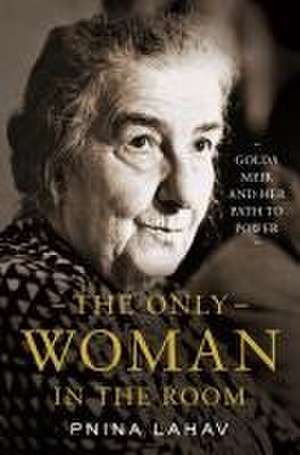The Only Woman in the Room – Golda Meir and Her Path to Power
Autor Pnina Lahaven Limba Engleză Paperback – 13 mai 2024
| Toate formatele și edițiile | Preț | Express |
|---|---|---|
| Paperback (1) | 133.98 lei 22-36 zile | +29.48 lei 5-11 zile |
| Princeton University Press – 13 mai 2024 | 133.98 lei 22-36 zile | +29.48 lei 5-11 zile |
| Hardback (1) | 206.50 lei 22-36 zile | +51.19 lei 5-11 zile |
| Princeton University Press – 31 oct 2022 | 206.50 lei 22-36 zile | +51.19 lei 5-11 zile |
Preț: 133.98 lei
Nou
25.64€ • 26.71$ • 21.32£
Carte disponibilă
Livrare economică 20 ianuarie-03 februarie 25
Livrare express 03-09 ianuarie 25 pentru 39.47 lei
Specificații
ISBN-10: 0691239339
Pagini: 376
Dimensiuni: 155 x 234 x 15 mm
Greutate: 0.5 kg
Editura: Princeton University Press
Notă biografică
Descriere
A feminist biography of the only woman to become prime minister of IsraelIn this authoritative and empathetic biography, Pnina Lahav reexamines the life of Golda Meir (1898-1978) through a feminist lens, focusing on her recurring role as a woman standing alone among men.
The Only Woman in the Room is the first book to contend with Meir's full identity as a woman, Jew, Zionist leader, and one of the founders of Israel, providing a richer portrait of her persona and legacy. Meir, Lahav shows, deftly deflected misogyny as she traveled the path to becoming Israel's fourth, and only female, prime minister, from 1969 to 1974.
Lahav revisits the youthful encounters that forged Meir's passion for socialist Zionism and reassesses her decision to separate from her husband and leave her children in the care of others. Enduring humiliation and derision from her colleagues, Meir nevertheless led in establishing Israel as a welfare state where social security, workers' rights, and maternity leave became law. Lahav looks at the challenges that beset Meir's premiership, particularly the disastrous Yom Kippur War, which led to her resignation and withdrawal from politics, as well as Meir's bitter duel with feminist and civil rights leader Shulamit Aloni, Meir's complex relationship with the Israeli and American feminist movements, and the politics that led her to distance herself from feminism altogether.
Exploring the tensions between Meir's personal and political identities, The Only Woman in the Room provides a groundbreaking new account of Meir's life while also illuminating the difficulties all women face as they try to ascend in male-dominated fields.
